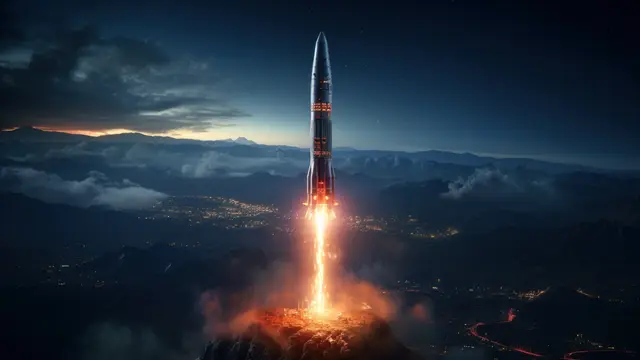China is ready to embark on an exciting venture into the realm of space tourism, led by the pioneering efforts of Deep Blue Aerospace, a tech start-up based in Jiangsu province.
The company announced plans to launch its first suborbital space tourism flights in 2027, positioning itself as the frontrunner in China’s commercial space travel sector.

Deep Blue Aerospace has taken a significant stride by putting the first tickets up for sale.
These tickets were made available during a live streaming event on the popular e-commerce platform Taobao and impressively sold out in just 20 minutes.
At a cost of approximately $210,000 each, these tickets offer a 12-minute experience allowing passengers to enjoy at least five minutes of weightlessness in outer space.
Comparatively, the price set by Deep Blue Aerospace appears more affordable than the $600,000 charged for spaceflights by Virgin Galactic, the company founded by British billionaire Richard Branson.
The fascination with the heavy price tags hasn’t deterred interest; in fact, there is a growing anticipation of further ticket releases next month.
According to the startup, the passengers will embark on a suborbital journey, which involves traveling to the edge of outer space without orbiting the Earth.
This meticulous approach intends to provide a thrilling yet safe experience, without exposing travelers to the complexities of entering Earth’s orbit.
Deputy chairman of Deep Blue Aerospace, Huo Liang, noted that advances in orbit-capable, reusable rocket technology could potentially convert this luxurious experience into a more frequent reality.

This could eventually drive costs down, making space travel a viable option for a broader audience.
Implementing reusable rockets is a crucial element in this equation.
While China has demonstrated considerable expertise with manned space missions, the high costs associated with such endeavors remain a challenge.
The move towards reusable technology aims to reduce these costs and facilitate sustainable commercial space tourism.
With their plans to conduct numerous tests leading up to the groundbreaking flight in 2027, Deep Blue Aerospace expresses a commitment to addressing the intricate risks involved with rocket technology.
These tests aim to secure the safety and reliability of their offerings before launching this bold new frontier.
While space tourism is not a novel concept globally—with western companies like Jeff Bezos’ Blue Origin and Elon Musk’s SpaceX already advancing the sector—it is relatively new in the context of China’s emerging commercial space endeavors.
This development could accelerate China’s position in the global hierarchy of space tourism.
The introduction of China’s maiden commercial space tourism also reflects a broader shift in the space race dynamics, with Asia ascending as an influential player in this new cosmic arena.
Much attention is focused on how Chinese companies might leverage their technological advancements to make space travel more accessible.
As the countdown to 2027 begins, excitement builds around the promise of space tourism becoming a more grounded reality.
With Deep Blue Aerospace at the helm, China’s entrance into the space tourism market not only promises exhilarating adventures but also sparks a competitive spirit that could make outer space a common vacation destination in the not-so-distant future.
